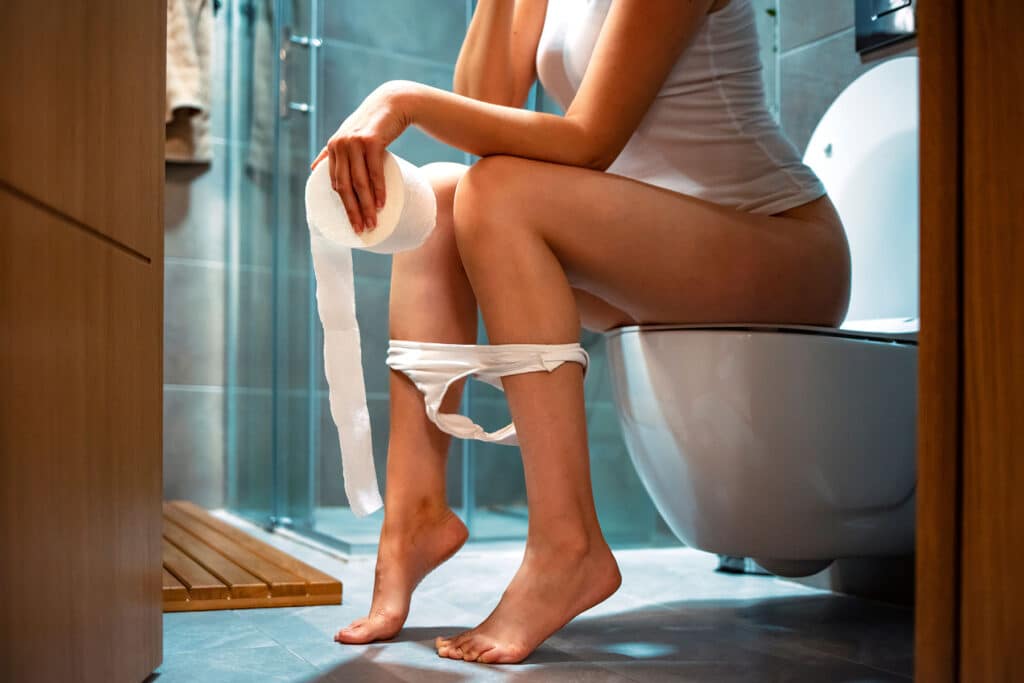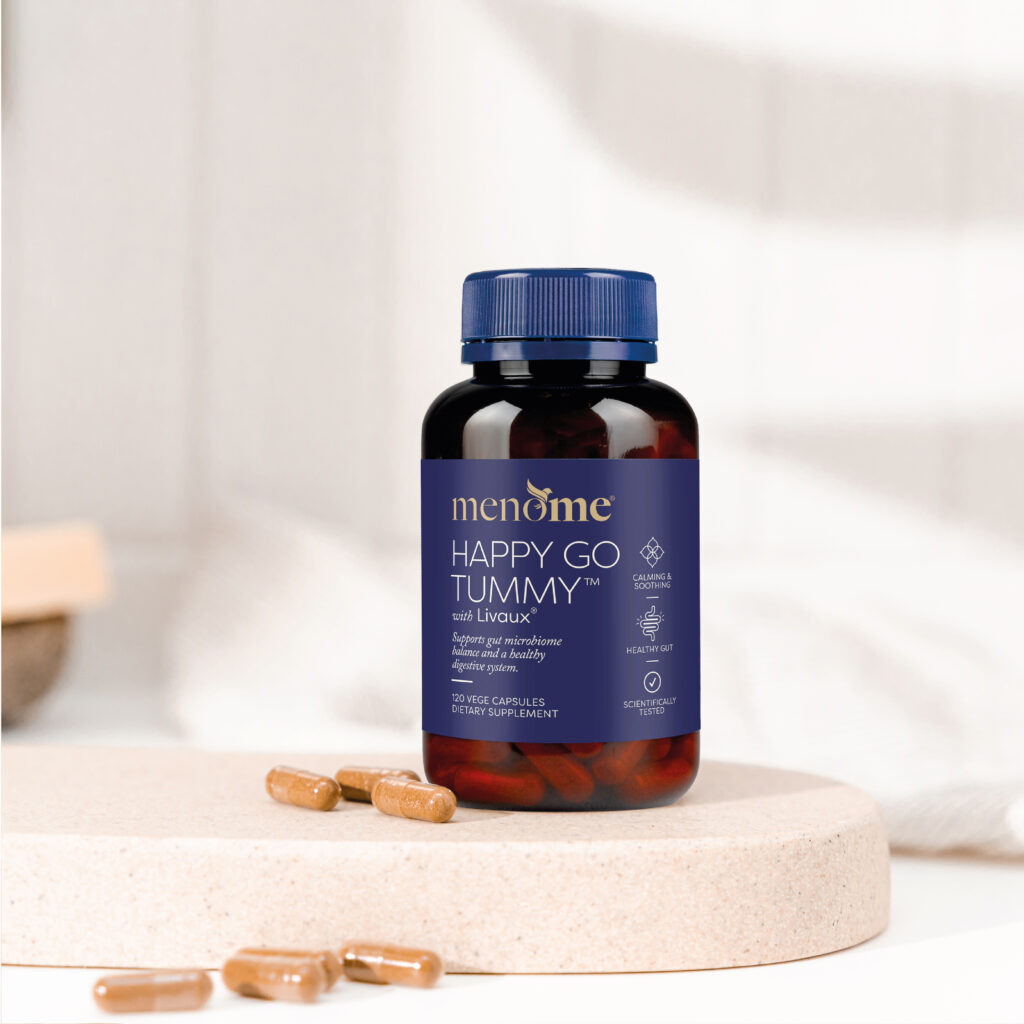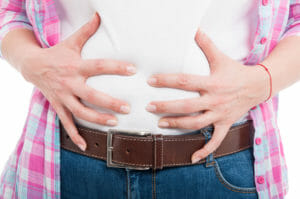Are you experiencing constipation or sluggish poop movements?
Yep, we’re going there. 💩
It might feel awkward to talk about, but it’s important. (And yes, it can be uncomfortable – in every sense of the word! 😊)
The truth is, constipation and slow digestion can show up as bloating, fluffing (that’s gas), fluid retention, and even skin issues. 🤭
And guess what? Constipation can become more common during menopause and midlife, thanks to all the changes happening in your body.
It’s often part and parcel of the journey.
So, in the interests of your happiest, healthiest menopause, we really do need to chat about your poop.
Why does constipation happen?
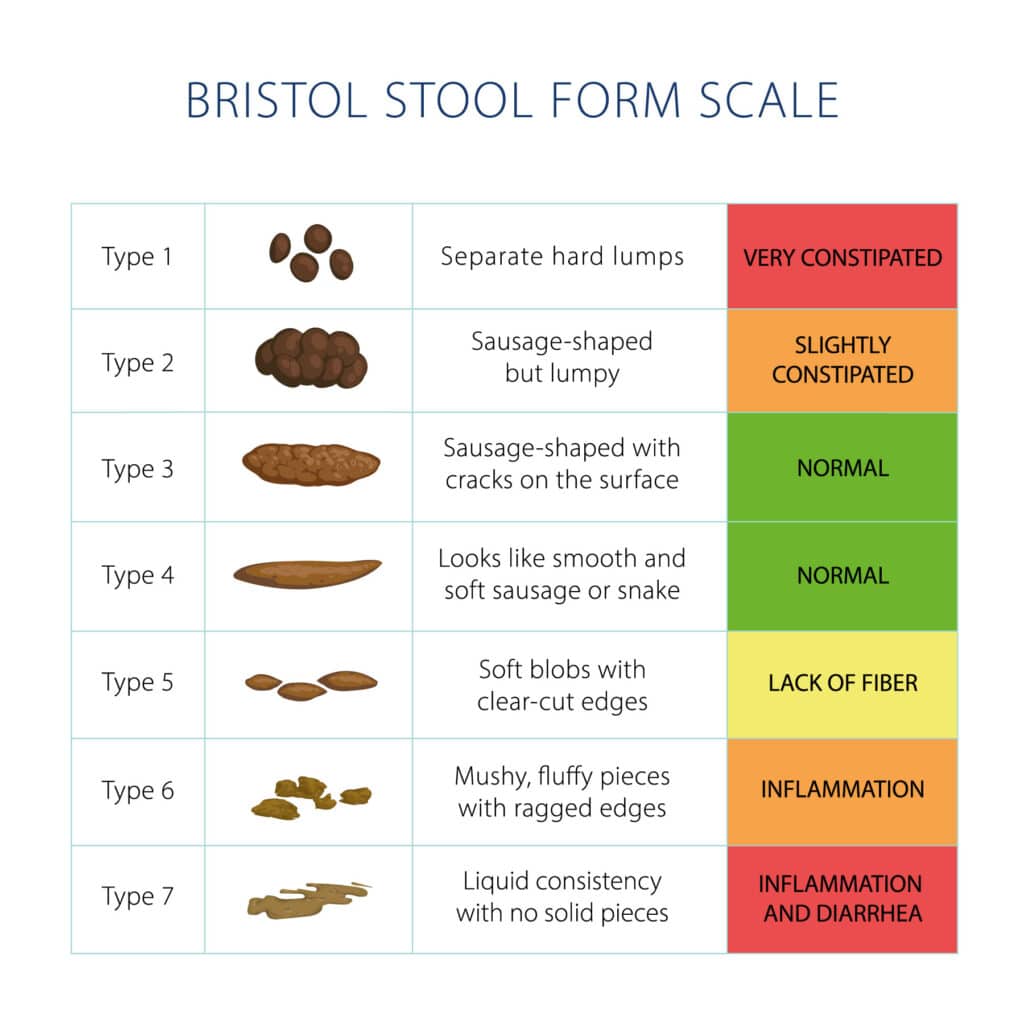
There can be a few reasons for constipation and sluggish poop problems, and one of them is a digestive system that’s simply on the go-slow.
When it comes to your poop you want it to be nicely formed and travelling with ease. 💩
But sometimes, things can swing the other way – becoming too loose or compacted. Take a look at the Bristol stool chart (left) to get an idea of where you’re sitting (literally).
Does something need to change?
If so, you’re not alone.💙
The link between your liver, gallbladder, bile & constipation
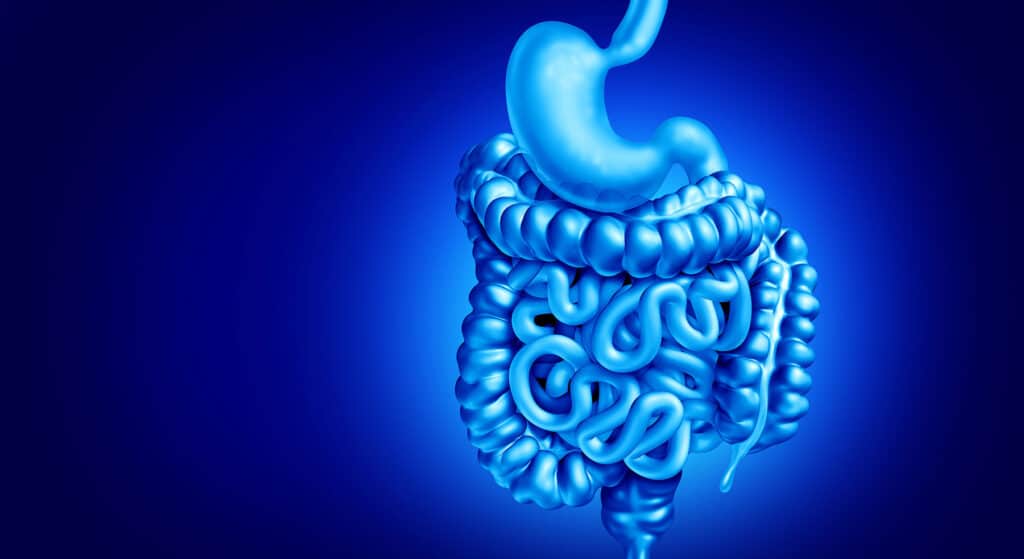
We often talk about loving your liver – and for good reason.
Your liver is one of your body’s major detoxification organs. One of its key jobs is to clear out excess estrogen and other toxins that we eat, produce and absorb from our environment.
If your liver isn’t working efficiently, it can lead to more intense menopause signs and symptoms. Plus, it can also contribute to irregular pooping. 💩
So showing your liver some love is about more than just detox – it’s about helping your whole body (and your hormones) feel more balanced and comfortable during midlife.
When it comes to your gallbladder and bile production, everything is closely linked to your liver.
Your liver makes bile, which is then stored in your gallbladder, ready to help you digest fats when needed.
If you’ve had your gallbladder removed, your liver still makes bile – but instead of storing it, the bile is produced and released as needed.
You might be thinking, “Hang on, aren’t we supposed to be talking poop?”
Yes, indeed we are!
But here’s the thing: a happy gallbladder can help keep your bowels moving.
Bile doesn’t just break down fats (or fat-soluble toxins) – it also helps your poop slide smoothly through your system. When the bile production isn’t functioning well, things can slow down and clog up.
So if you want happy bowels, it’s worth giving a little love to your liver and your gallbladder too. 💙
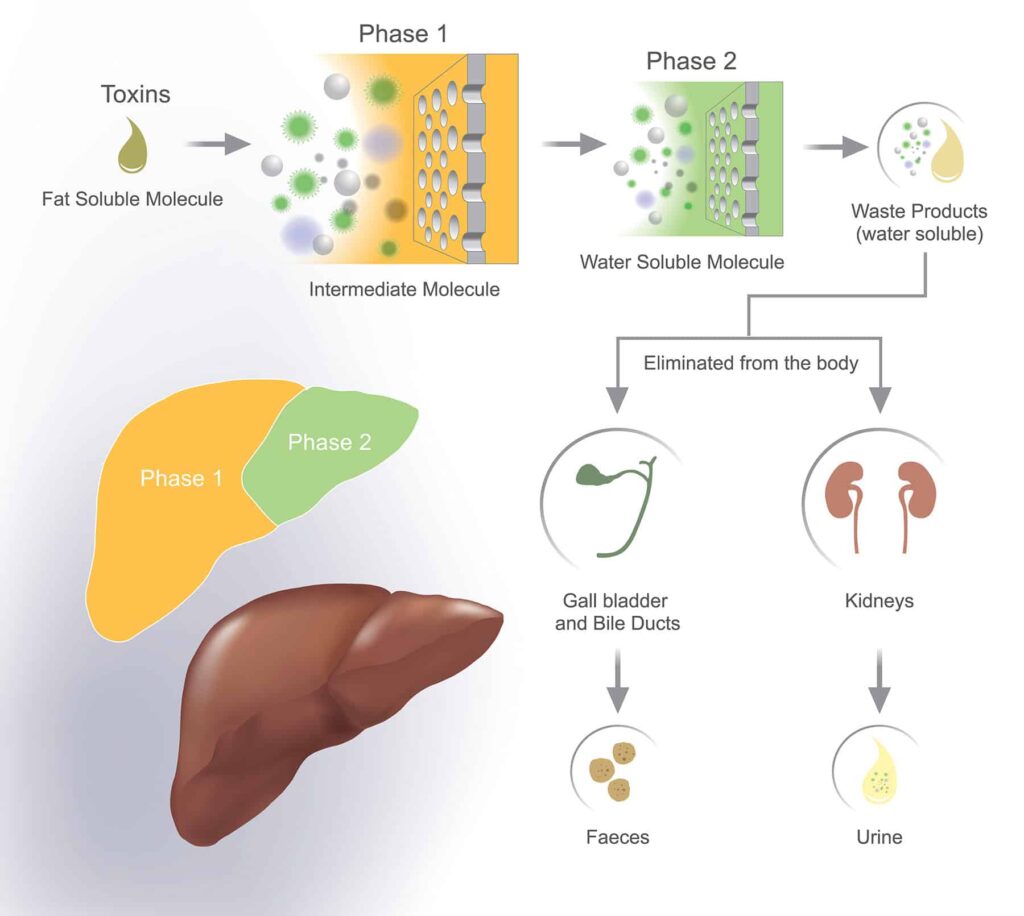
So, a happy liver + happy gallbladder + happy bile flow = happy poop! 💩
Tip: everyone’s a little different, but the general consensus is most people poop anywhere from three times a week to three times a day.
Now we’ve got that backstory out of the way here are:
6 Ways To Boost Your Bowels
(ditch constipation and keep regular)
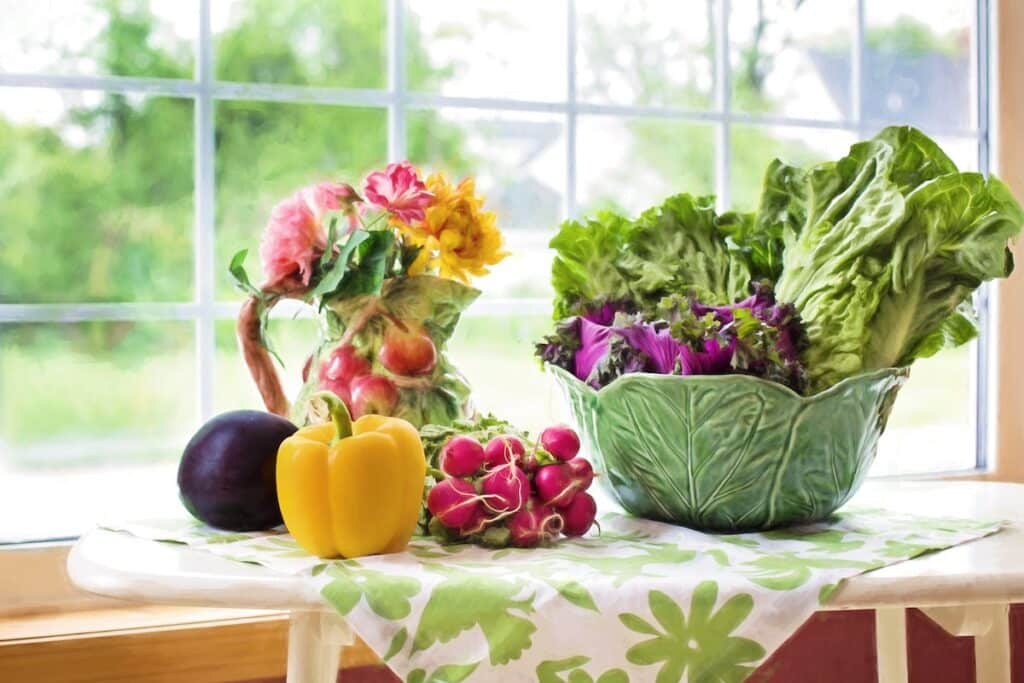
1. Eat fibre
Although fibre is super important for healthy pooping, most of us don’t eat nearly enough it. In fact, gastroenterologist Dr Will Bulsiewicz says 19 out of 20 people aren’t getting enough.
According to NRVs (Nutrient Reference Values for Australia and New Zealand), you should be aiming for at least 25g of fibre per day.
Dietary fibre is the indigestible part of fruits, veggies, and whole grains like oats, quinoa and legumes. They’re often called prebiotics because they help feed your healthy gut bugs. You’ll also find fibre in prebiotic supplements (see 6).
There are two main types of fibre:
- Soluble fibre – helps balance blood sugar, aids digestion, keeps you fuller for longer, increases insulin sensitivity, and improves gut health.
- Insoluble fibre – soaks up water, softens your poop, and helps clear out your colon by removing waste and excess toxins.
And if you doubt those fibre statistics, fill up on larger servings on fibre-rich foods for a few days and notice:
a. how much more you poop, and
b. how much easier it is.
2. Ensure you’re adequately hydrated
Some people’s eyes glaze over when they hear “drink more water” – but honestly, it’s a total game-changer for everything from energy to brain fog. And most important for today’s topic – it’ll help you poop.
The general rule of thumb is around 35 mls per kilogram of body weight.
For example, if you’re 70kg that’s around 2.4 litres per day.
If all that math feels too complicated, don’t worry – there are easy apps to help track your water intake like this one.
Also remember: eating high-water content foods (like fruit and veggies) count towards your daily hydration too.
3. Take a load off your liver
Try to avoid liver loaders like caffeine, alcohol, and refined sugars. These can slow down your detoxification processes. (And yes, we can hear the collective groan)
But honestly, the benefits are so worth it.
Supporting your liver can not only help you poop more regularly, but it may also reduce menopause symptoms like hot flushes and headaches.
(Those are only caused by liver issues – but an unhappy liver can definitely contribute.) 💙
4. Go for bitter foods
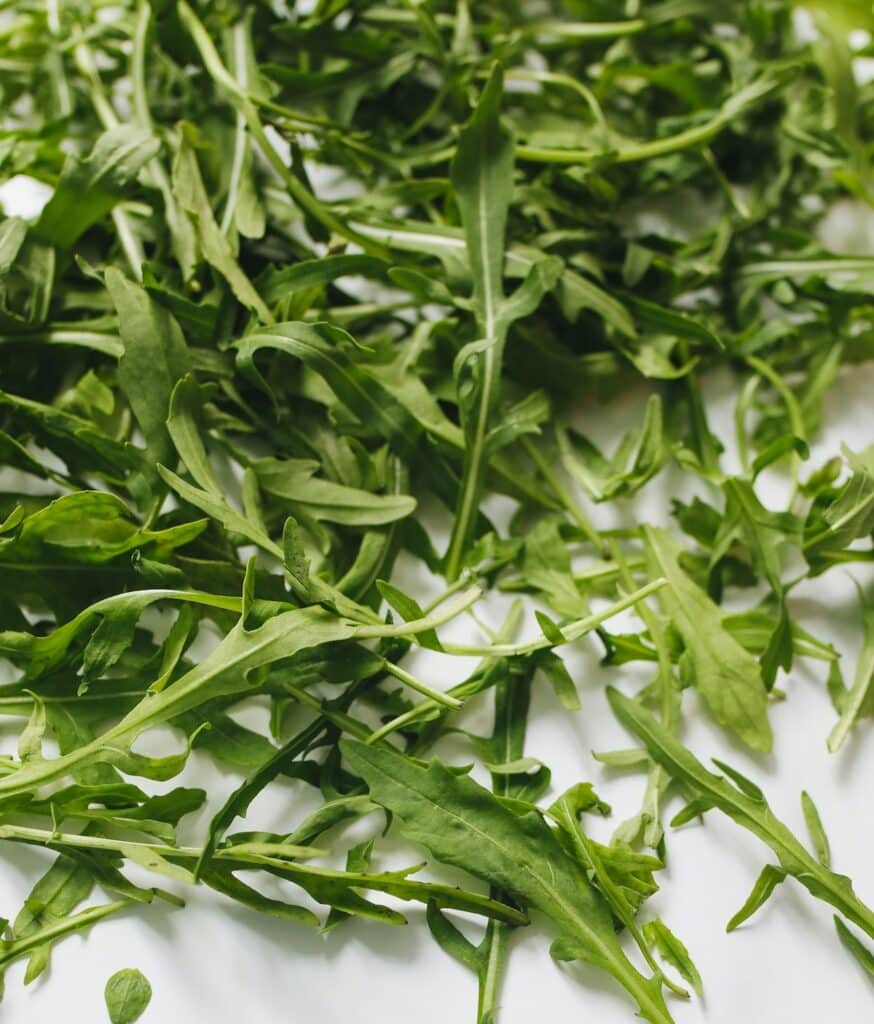
Chow down on bitter foods like rocket (pictured), watercress, kale, dandelion, saffron, sesame seeds, fenugreek and turmeric.
Bitter foods encourage your stomach acid, digestive enzyme, and bile production – all essential for happy poops.
In Ayurvedic medicine, bitters are said to light your digestive fire (called ‘agni’).
And today, we’re all about boosting that fire to keep your bowels moving. 🔥
5. Chew well
Most of us are guilty of inhaling our food (smile-y face), but chewing properly is super important for digestion.
The more you chew, the better off your gut is – and the smoother the exit, if you know what we mean!
Chewing helps soften and lubricate food, giving your digestive system a head start.
The ideal? Aim for 30 chews per mouthful.
But if that feels like a lot, start with 10-12 chews and build up. Your gut (and poop) will thank you.
6. Love your gut bugs
Your microbiome – the trillions of bacteria in your gut – play a huge role in digestion and regular pooping. 😀
You can support your gut health by eating fibre-rich foods and taking a good digestive supplement.
- Prebiotics feed your good bacteria.
- Probiotics help populate good bacteria.
That’s why we created Happy Go Tummy® – a combination prebiotic and probiotic specially designed to support a healthier gut, happioer poops, and better overall wellbeing.
Want to know more? Read: What’s the difference between a prebiotic and a probiotic here.
Conclusion
If you want to win the battle against constipation (and other poop problems) it’s possible. 🥇
Don’t be embarrassed – pooping is completely natural, and we’ve all had issues at one time or another.
Yes, it’s a little ‘crappy’ (pardon the pun!), but it’s true.
First, it’s a good idea to understand how your body works – because when you know better, you can do better.
(We always say knowledge is power and its especially true when it comes to your gut health.)
Lifestyle tweaks are always your first port of call, so start there.
Then back it up with some high-quality tools like a prebiotic and probiotic synbiotic.
And we’ve got to say Happy Go Tummy® – featuring the award-winning Livaux® is truly a game-changer.
With the right support, you’ll be way ahead of the game in no time!
Disclaimer: Our articles are guidelines only and should never be taken as medical advice. Any signs and symptoms you’re experiencing could be due to a number of reasons. If you’re experiencing ongoing signs, please see your health professional.
Just so you know: this article is written by a real person who has studied the physiology of menopause and women’s healthy ageing. While we may use AI as an assistant, the research, insights and heart behind every piece comes from us.
